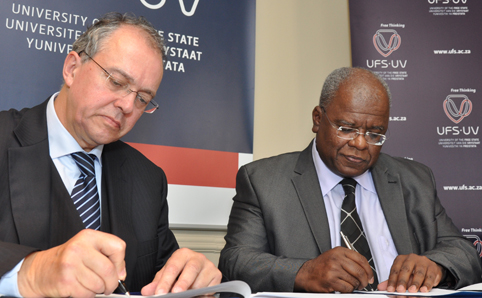Latest News Archive
Please select Category, Year, and then Month to display items
12 October 2020
|
Story Arina Engelbrecht
|
Photo Supplied
 Arina Engelbrecht from Organisational Development and Employee Well-being believes physical activity has a number of benefits for one’s health, including stress relief.
Arina Engelbrecht from Organisational Development and Employee Well-being believes physical activity has a number of benefits for one’s health, including stress relief.
Being physically active plays a big role in preventing the development of mental-health problems and in improving the quality of life of people experiencing mental-health problems.
Treatment for depression
Physical activity can be an alternative treatment for depression. It can be used as a stand-alone treatment or in combination with medication and/or psychological therapy. It promotes all kinds of changes in the brain, including neural growth, reduced inflammation, and new activity patterns are formed that promote feelings of calm and well-being. It releases endorphins – powerful chemicals in the brain that energise your spirit and make you feel good.
Physical activity can be very effective in relieving stress. Research in adults has found that physically active individuals tend to have lower stress levels compared to individuals who are less active. It also leads to improved sleep. When a person sleeps better and feels more rested, overall quality of life improves. They cope better with daily life stressors.
Reduce Alzheimer's risk
Regular physical activity can reduce your risk of developing Alzheimer's disease by up to 50%. It can also slow down further deterioration in those who have already started to develop cognitive problems. It stimulates the brain’s ability to maintain old connections as well as to make new ones.
A study asked people to rate their mood immediately after periods of physical activity (e.g. going for a walk/run, cycling, doing housework) and periods of inactivity (e.g. reading a book or watching television). Researchers found that participants felt more content, more awake, and calmer after being physically active compared to after periods of inactivity.
In conclusion, people who are physically active feel a sense of well-being, feel more energetic throughout the day, sleep better at night, have sharper memories, and feel more relaxed and positive about themselves and their lives.
“Being physically active not only changes your body, it changes your mind,
attitude, and your mood.” – Arina Engelbrecht
UFS in new partnership with the Vrije University of Amsterdam
2011-11-17
 |
|
Proff. Lex Boutler (left) from the Vrije University of Amsterdam and Jonathan Jansen are signing an institutional Memorandum of Understanding. Prof. Boutler was part of a delegation that visited the campus two weeks ago.
|
A delegation from the Vrije University of Amsterdam (VUA) visited the UFS two weeks ago to discuss and sign an institutional Memorandum of Understanding (MOU) between the VUA and UFS.
The MOU follows after academics have collaborated on a number of research projects between the Faculties of Theology and the International Institute for Studies in Race, Reconciliation and Social Justice to create a firm foundation for the two universities to strengthen their collaborative efforts towards achieving academic excellence.
Another initiative that was discussed was the possibility of a joint PhD project and mobility scholarship through the South Africa-VU Amsterdam Strategic Alliances (SAVUSA) and Stimulating Knowledge Innovation through Life-long Learning (SKILL) programme earmarked for UFS and VUA staff and Master’s and PhD graduate students.
The VUA delegation also had an opportunity to meet and engage with the UFS F1 students. These students will visit the VUA in January 2012, where they will also visit the Amsterdam University College (AUC).
The AUC is an international liberal arts and sciences programme that attracts students from all over the world to engage through intensive seminars on a variety of subjects.